Islamic Banking in theory and practice
VerifiedAdded on 2023/01/17
|17
|4078
|79
AI Summary
This document provides an overview of Islamic banking, including its theory and practice. It covers central banking products, ethical values, and the regulatory frameworks in different countries. The document also discusses the challenges and advantages of Islamic banking.
Contribute Materials
Your contribution can guide someone’s learning journey. Share your
documents today.
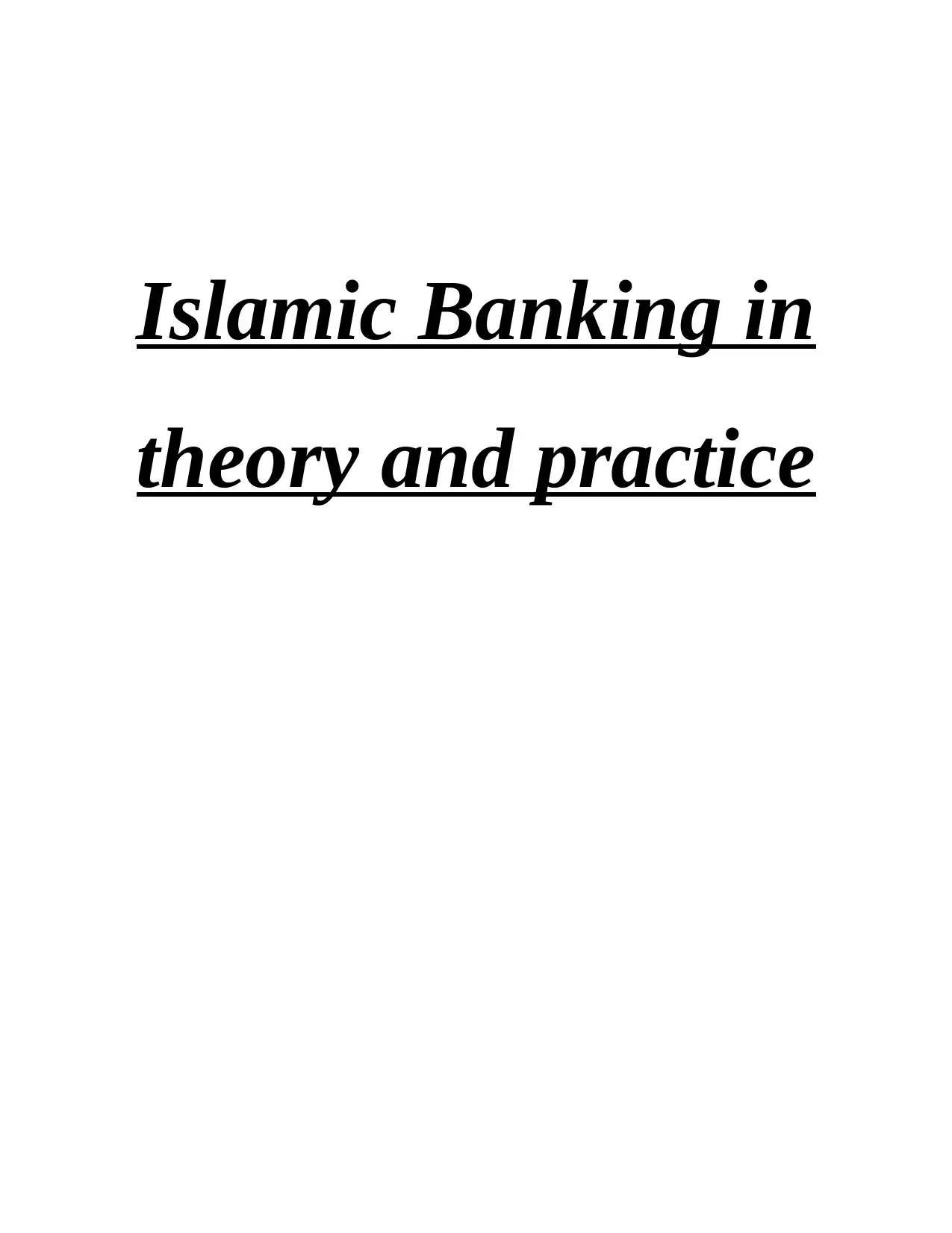
Islamic Banking in
theory and practice
theory and practice
Secure Best Marks with AI Grader
Need help grading? Try our AI Grader for instant feedback on your assignments.
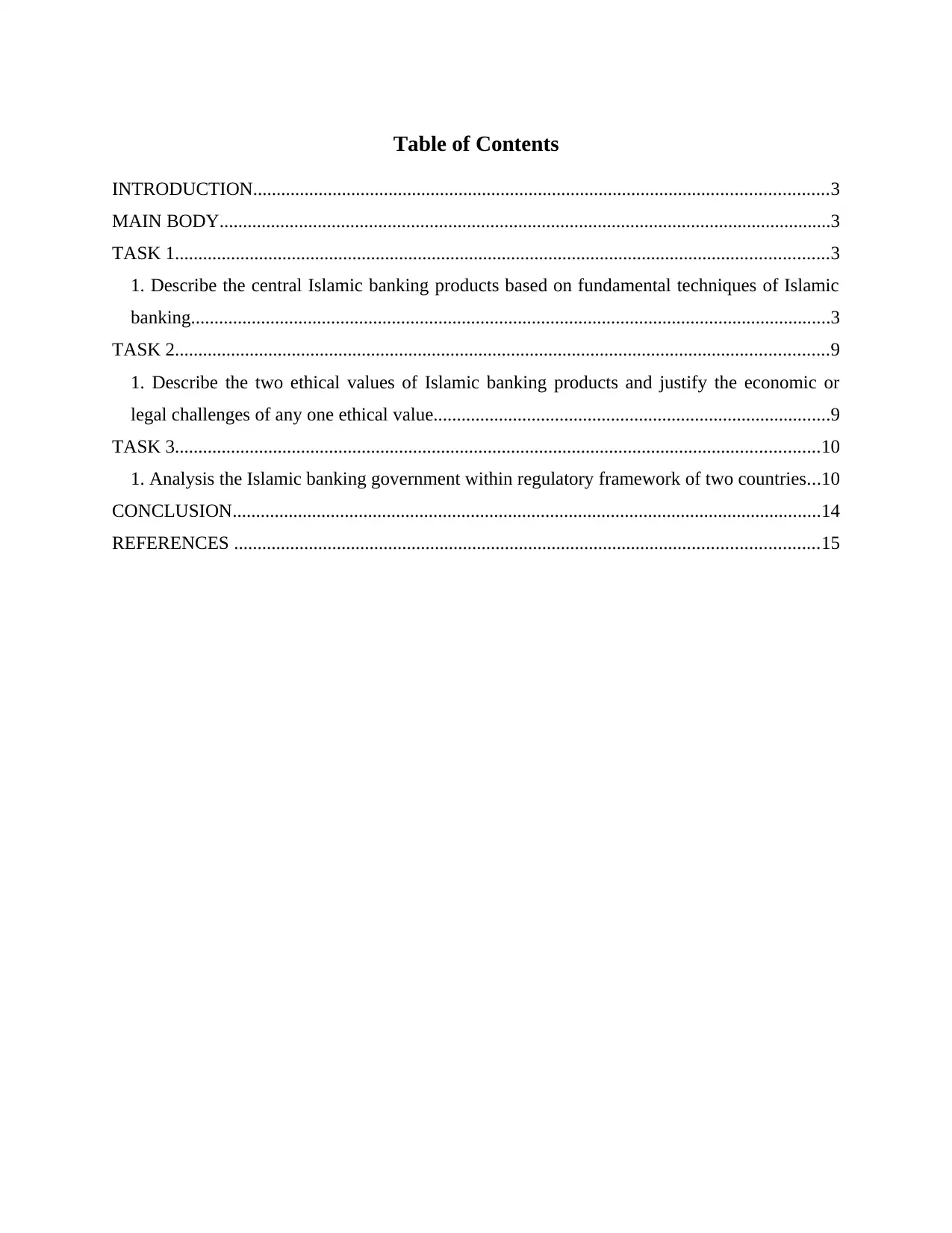
Table of Contents
INTRODUCTION...........................................................................................................................3
MAIN BODY...................................................................................................................................3
TASK 1............................................................................................................................................3
1. Describe the central Islamic banking products based on fundamental techniques of Islamic
banking.........................................................................................................................................3
TASK 2............................................................................................................................................9
1. Describe the two ethical values of Islamic banking products and justify the economic or
legal challenges of any one ethical value.....................................................................................9
TASK 3..........................................................................................................................................10
1. Analysis the Islamic banking government within regulatory framework of two countries...10
CONCLUSION..............................................................................................................................14
REFERENCES .............................................................................................................................15
INTRODUCTION...........................................................................................................................3
MAIN BODY...................................................................................................................................3
TASK 1............................................................................................................................................3
1. Describe the central Islamic banking products based on fundamental techniques of Islamic
banking.........................................................................................................................................3
TASK 2............................................................................................................................................9
1. Describe the two ethical values of Islamic banking products and justify the economic or
legal challenges of any one ethical value.....................................................................................9
TASK 3..........................................................................................................................................10
1. Analysis the Islamic banking government within regulatory framework of two countries...10
CONCLUSION..............................................................................................................................14
REFERENCES .............................................................................................................................15
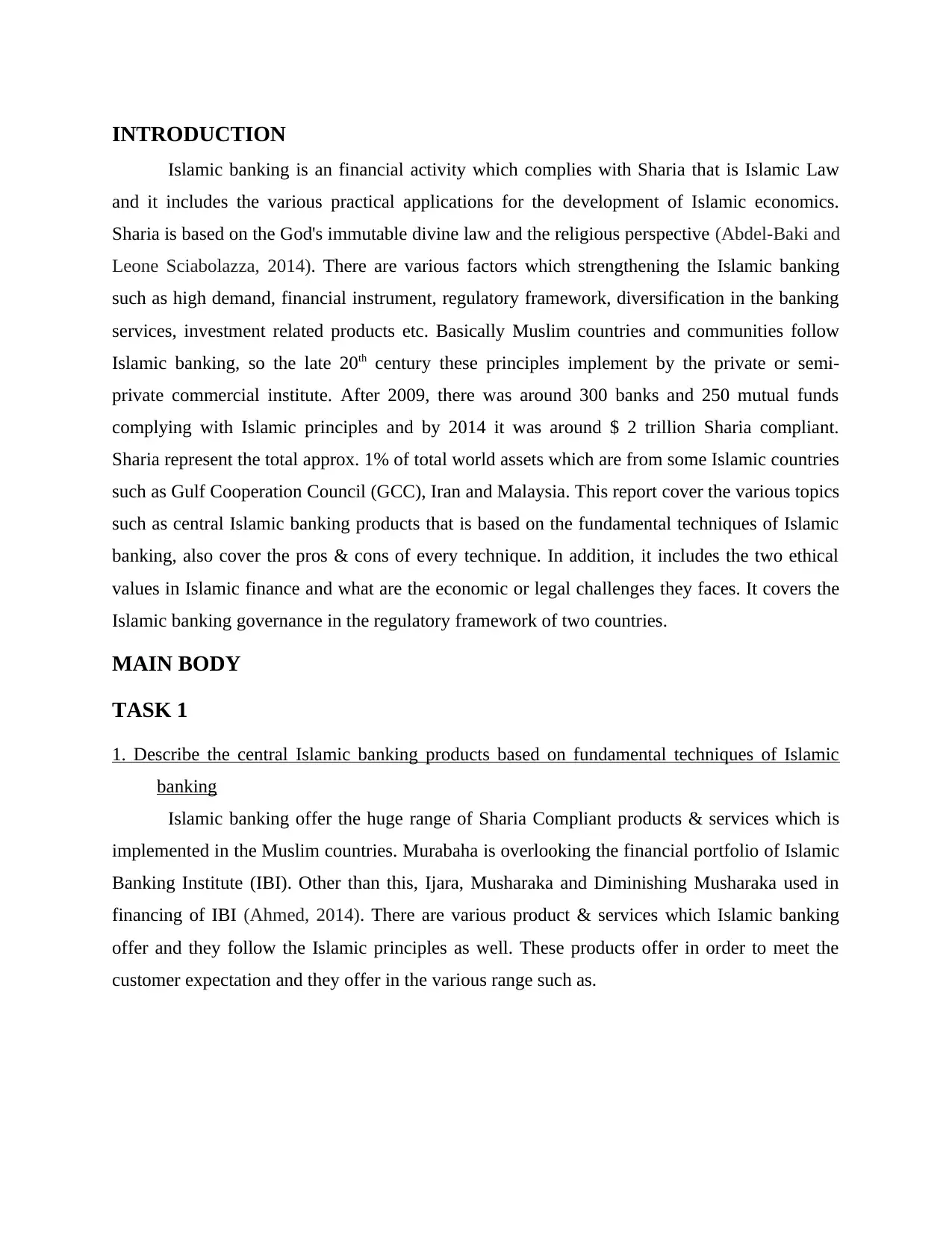
INTRODUCTION
Islamic banking is an financial activity which complies with Sharia that is Islamic Law
and it includes the various practical applications for the development of Islamic economics.
Sharia is based on the God's immutable divine law and the religious perspective (Abdel-Baki and
Leone Sciabolazza, 2014). There are various factors which strengthening the Islamic banking
such as high demand, financial instrument, regulatory framework, diversification in the banking
services, investment related products etc. Basically Muslim countries and communities follow
Islamic banking, so the late 20th century these principles implement by the private or semi-
private commercial institute. After 2009, there was around 300 banks and 250 mutual funds
complying with Islamic principles and by 2014 it was around $ 2 trillion Sharia compliant.
Sharia represent the total approx. 1% of total world assets which are from some Islamic countries
such as Gulf Cooperation Council (GCC), Iran and Malaysia. This report cover the various topics
such as central Islamic banking products that is based on the fundamental techniques of Islamic
banking, also cover the pros & cons of every technique. In addition, it includes the two ethical
values in Islamic finance and what are the economic or legal challenges they faces. It covers the
Islamic banking governance in the regulatory framework of two countries.
MAIN BODY
TASK 1
1. Describe the central Islamic banking products based on fundamental techniques of Islamic
banking
Islamic banking offer the huge range of Sharia Compliant products & services which is
implemented in the Muslim countries. Murabaha is overlooking the financial portfolio of Islamic
Banking Institute (IBI). Other than this, Ijara, Musharaka and Diminishing Musharaka used in
financing of IBI (Ahmed, 2014). There are various product & services which Islamic banking
offer and they follow the Islamic principles as well. These products offer in order to meet the
customer expectation and they offer in the various range such as.
Islamic banking is an financial activity which complies with Sharia that is Islamic Law
and it includes the various practical applications for the development of Islamic economics.
Sharia is based on the God's immutable divine law and the religious perspective (Abdel-Baki and
Leone Sciabolazza, 2014). There are various factors which strengthening the Islamic banking
such as high demand, financial instrument, regulatory framework, diversification in the banking
services, investment related products etc. Basically Muslim countries and communities follow
Islamic banking, so the late 20th century these principles implement by the private or semi-
private commercial institute. After 2009, there was around 300 banks and 250 mutual funds
complying with Islamic principles and by 2014 it was around $ 2 trillion Sharia compliant.
Sharia represent the total approx. 1% of total world assets which are from some Islamic countries
such as Gulf Cooperation Council (GCC), Iran and Malaysia. This report cover the various topics
such as central Islamic banking products that is based on the fundamental techniques of Islamic
banking, also cover the pros & cons of every technique. In addition, it includes the two ethical
values in Islamic finance and what are the economic or legal challenges they faces. It covers the
Islamic banking governance in the regulatory framework of two countries.
MAIN BODY
TASK 1
1. Describe the central Islamic banking products based on fundamental techniques of Islamic
banking
Islamic banking offer the huge range of Sharia Compliant products & services which is
implemented in the Muslim countries. Murabaha is overlooking the financial portfolio of Islamic
Banking Institute (IBI). Other than this, Ijara, Musharaka and Diminishing Musharaka used in
financing of IBI (Ahmed, 2014). There are various product & services which Islamic banking
offer and they follow the Islamic principles as well. These products offer in order to meet the
customer expectation and they offer in the various range such as.
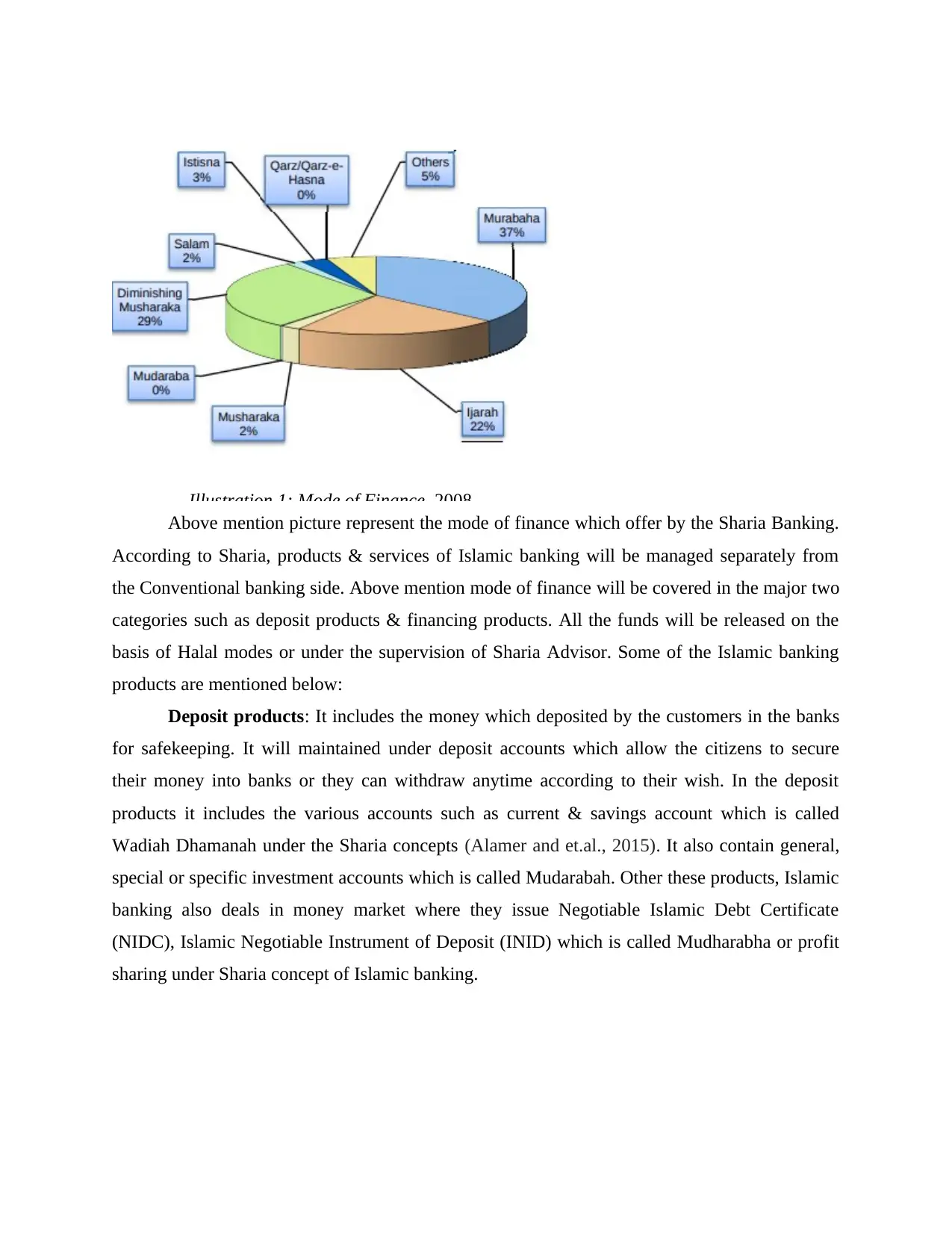
Illustration 1: Mode of Finance, 2008.
Above mention picture represent the mode of finance which offer by the Sharia Banking.
According to Sharia, products & services of Islamic banking will be managed separately from
the Conventional banking side. Above mention mode of finance will be covered in the major two
categories such as deposit products & financing products. All the funds will be released on the
basis of Halal modes or under the supervision of Sharia Advisor. Some of the Islamic banking
products are mentioned below:
Deposit products: It includes the money which deposited by the customers in the banks
for safekeeping. It will maintained under deposit accounts which allow the citizens to secure
their money into banks or they can withdraw anytime according to their wish. In the deposit
products it includes the various accounts such as current & savings account which is called
Wadiah Dhamanah under the Sharia concepts (Alamer and et.al., 2015). It also contain general,
special or specific investment accounts which is called Mudarabah. Other these products, Islamic
banking also deals in money market where they issue Negotiable Islamic Debt Certificate
(NIDC), Islamic Negotiable Instrument of Deposit (INID) which is called Mudharabha or profit
sharing under Sharia concept of Islamic banking.
Above mention picture represent the mode of finance which offer by the Sharia Banking.
According to Sharia, products & services of Islamic banking will be managed separately from
the Conventional banking side. Above mention mode of finance will be covered in the major two
categories such as deposit products & financing products. All the funds will be released on the
basis of Halal modes or under the supervision of Sharia Advisor. Some of the Islamic banking
products are mentioned below:
Deposit products: It includes the money which deposited by the customers in the banks
for safekeeping. It will maintained under deposit accounts which allow the citizens to secure
their money into banks or they can withdraw anytime according to their wish. In the deposit
products it includes the various accounts such as current & savings account which is called
Wadiah Dhamanah under the Sharia concepts (Alamer and et.al., 2015). It also contain general,
special or specific investment accounts which is called Mudarabah. Other these products, Islamic
banking also deals in money market where they issue Negotiable Islamic Debt Certificate
(NIDC), Islamic Negotiable Instrument of Deposit (INID) which is called Mudharabha or profit
sharing under Sharia concept of Islamic banking.
Secure Best Marks with AI Grader
Need help grading? Try our AI Grader for instant feedback on your assignments.
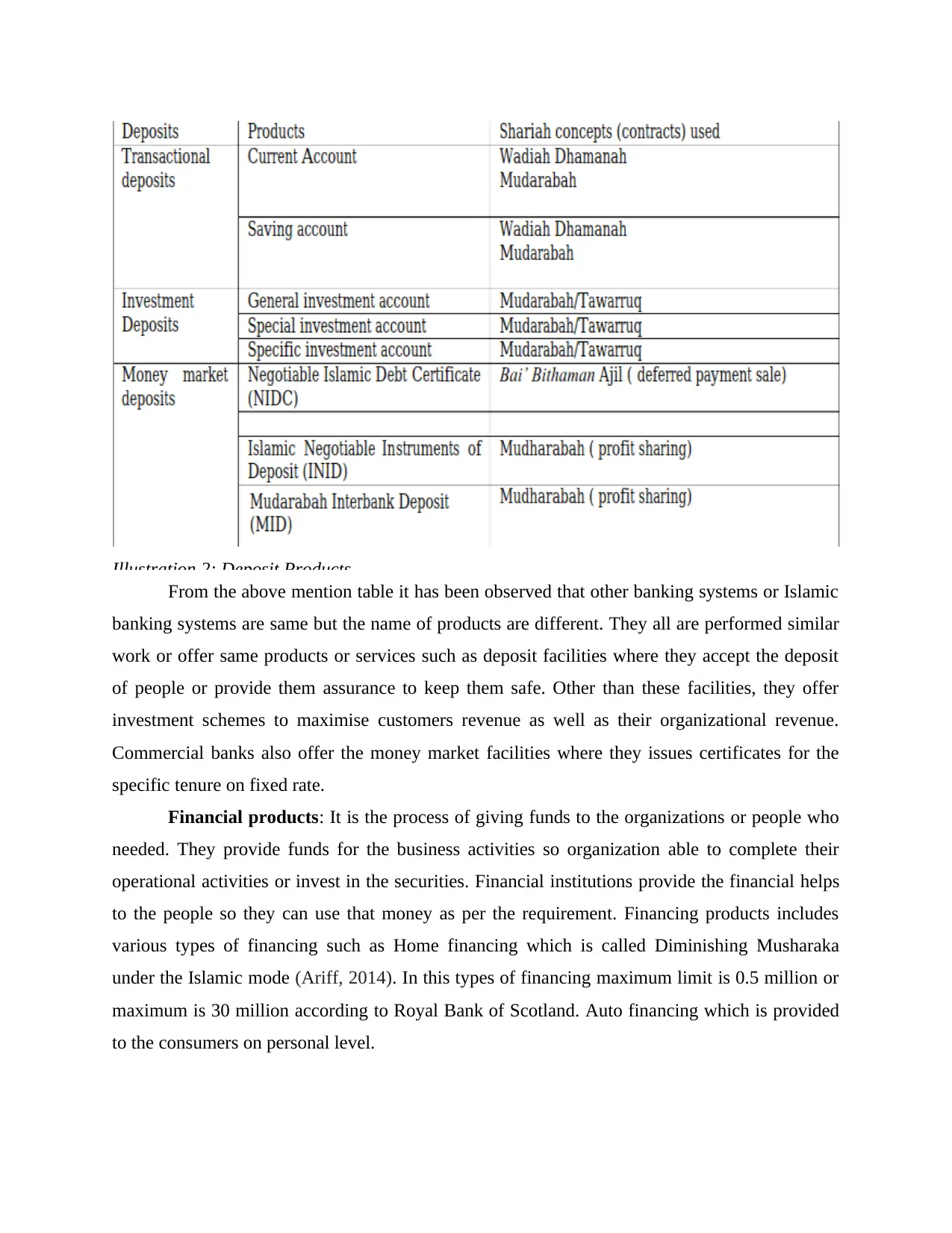
Illustration 2: Deposit Products.
From the above mention table it has been observed that other banking systems or Islamic
banking systems are same but the name of products are different. They all are performed similar
work or offer same products or services such as deposit facilities where they accept the deposit
of people or provide them assurance to keep them safe. Other than these facilities, they offer
investment schemes to maximise customers revenue as well as their organizational revenue.
Commercial banks also offer the money market facilities where they issues certificates for the
specific tenure on fixed rate.
Financial products: It is the process of giving funds to the organizations or people who
needed. They provide funds for the business activities so organization able to complete their
operational activities or invest in the securities. Financial institutions provide the financial helps
to the people so they can use that money as per the requirement. Financing products includes
various types of financing such as Home financing which is called Diminishing Musharaka
under the Islamic mode (Ariff, 2014). In this types of financing maximum limit is 0.5 million or
maximum is 30 million according to Royal Bank of Scotland. Auto financing which is provided
to the consumers on personal level.
From the above mention table it has been observed that other banking systems or Islamic
banking systems are same but the name of products are different. They all are performed similar
work or offer same products or services such as deposit facilities where they accept the deposit
of people or provide them assurance to keep them safe. Other than these facilities, they offer
investment schemes to maximise customers revenue as well as their organizational revenue.
Commercial banks also offer the money market facilities where they issues certificates for the
specific tenure on fixed rate.
Financial products: It is the process of giving funds to the organizations or people who
needed. They provide funds for the business activities so organization able to complete their
operational activities or invest in the securities. Financial institutions provide the financial helps
to the people so they can use that money as per the requirement. Financing products includes
various types of financing such as Home financing which is called Diminishing Musharaka
under the Islamic mode (Ariff, 2014). In this types of financing maximum limit is 0.5 million or
maximum is 30 million according to Royal Bank of Scotland. Auto financing which is provided
to the consumers on personal level.
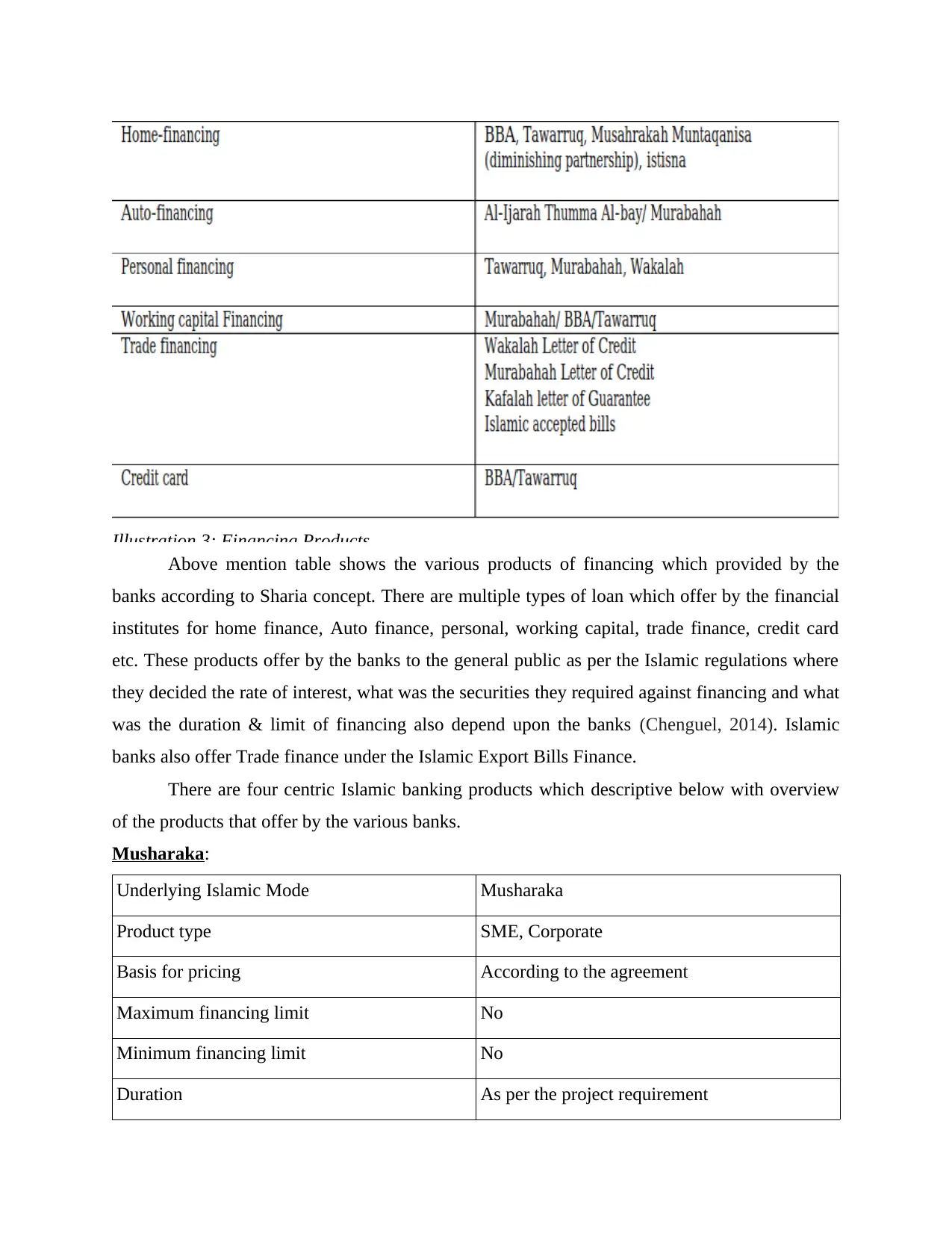
Illustration 3: Financing Products.
Above mention table shows the various products of financing which provided by the
banks according to Sharia concept. There are multiple types of loan which offer by the financial
institutes for home finance, Auto finance, personal, working capital, trade finance, credit card
etc. These products offer by the banks to the general public as per the Islamic regulations where
they decided the rate of interest, what was the securities they required against financing and what
was the duration & limit of financing also depend upon the banks (Chenguel, 2014). Islamic
banks also offer Trade finance under the Islamic Export Bills Finance.
There are four centric Islamic banking products which descriptive below with overview
of the products that offer by the various banks.
Musharaka:
Underlying Islamic Mode Musharaka
Product type SME, Corporate
Basis for pricing According to the agreement
Maximum financing limit No
Minimum financing limit No
Duration As per the project requirement
Above mention table shows the various products of financing which provided by the
banks according to Sharia concept. There are multiple types of loan which offer by the financial
institutes for home finance, Auto finance, personal, working capital, trade finance, credit card
etc. These products offer by the banks to the general public as per the Islamic regulations where
they decided the rate of interest, what was the securities they required against financing and what
was the duration & limit of financing also depend upon the banks (Chenguel, 2014). Islamic
banks also offer Trade finance under the Islamic Export Bills Finance.
There are four centric Islamic banking products which descriptive below with overview
of the products that offer by the various banks.
Musharaka:
Underlying Islamic Mode Musharaka
Product type SME, Corporate
Basis for pricing According to the agreement
Maximum financing limit No
Minimum financing limit No
Duration As per the project requirement
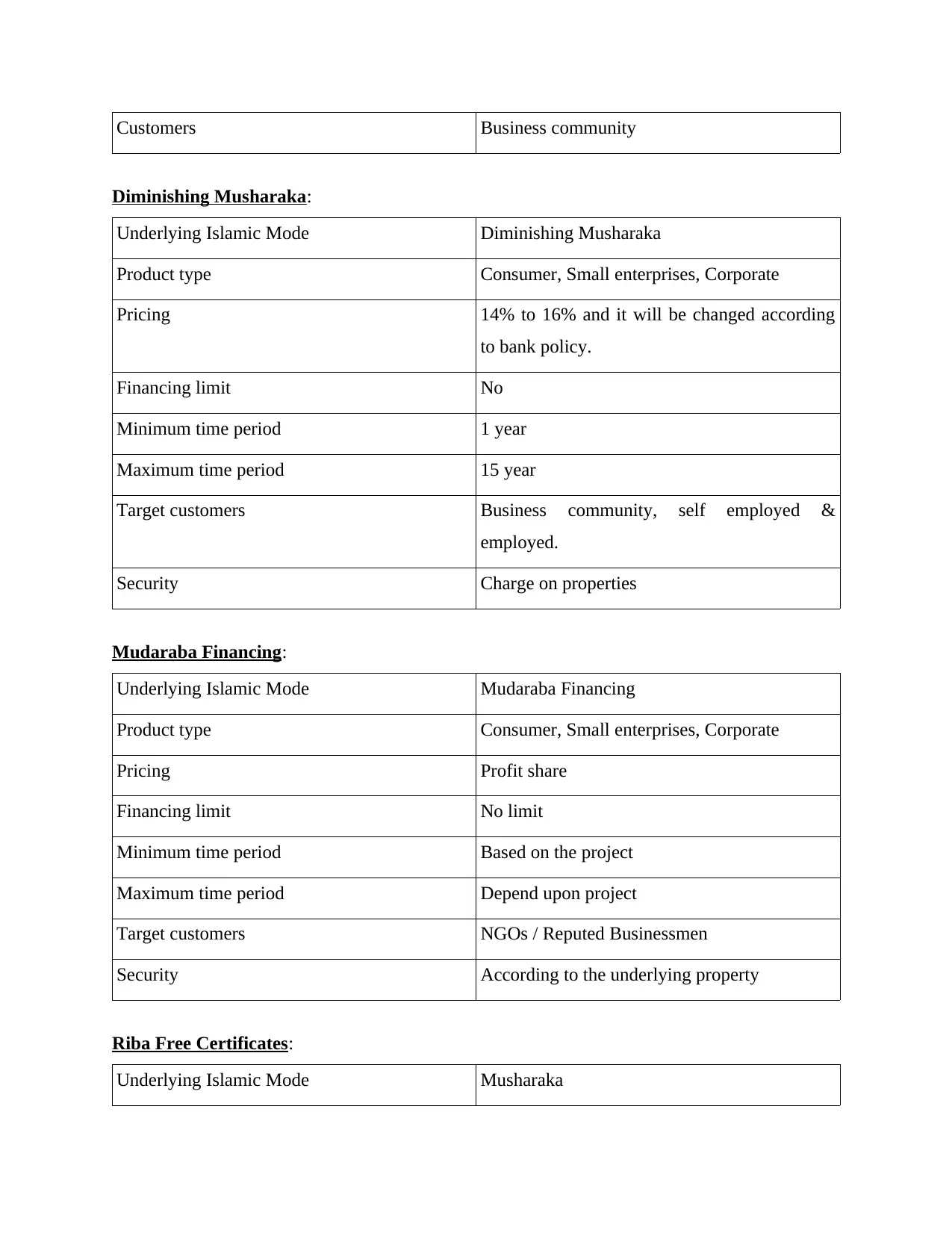
Customers Business community
Diminishing Musharaka:
Underlying Islamic Mode Diminishing Musharaka
Product type Consumer, Small enterprises, Corporate
Pricing 14% to 16% and it will be changed according
to bank policy.
Financing limit No
Minimum time period 1 year
Maximum time period 15 year
Target customers Business community, self employed &
employed.
Security Charge on properties
Mudaraba Financing:
Underlying Islamic Mode Mudaraba Financing
Product type Consumer, Small enterprises, Corporate
Pricing Profit share
Financing limit No limit
Minimum time period Based on the project
Maximum time period Depend upon project
Target customers NGOs / Reputed Businessmen
Security According to the underlying property
Riba Free Certificates:
Underlying Islamic Mode Musharaka
Diminishing Musharaka:
Underlying Islamic Mode Diminishing Musharaka
Product type Consumer, Small enterprises, Corporate
Pricing 14% to 16% and it will be changed according
to bank policy.
Financing limit No
Minimum time period 1 year
Maximum time period 15 year
Target customers Business community, self employed &
employed.
Security Charge on properties
Mudaraba Financing:
Underlying Islamic Mode Mudaraba Financing
Product type Consumer, Small enterprises, Corporate
Pricing Profit share
Financing limit No limit
Minimum time period Based on the project
Maximum time period Depend upon project
Target customers NGOs / Reputed Businessmen
Security According to the underlying property
Riba Free Certificates:
Underlying Islamic Mode Musharaka
Paraphrase This Document
Need a fresh take? Get an instant paraphrase of this document with our AI Paraphraser
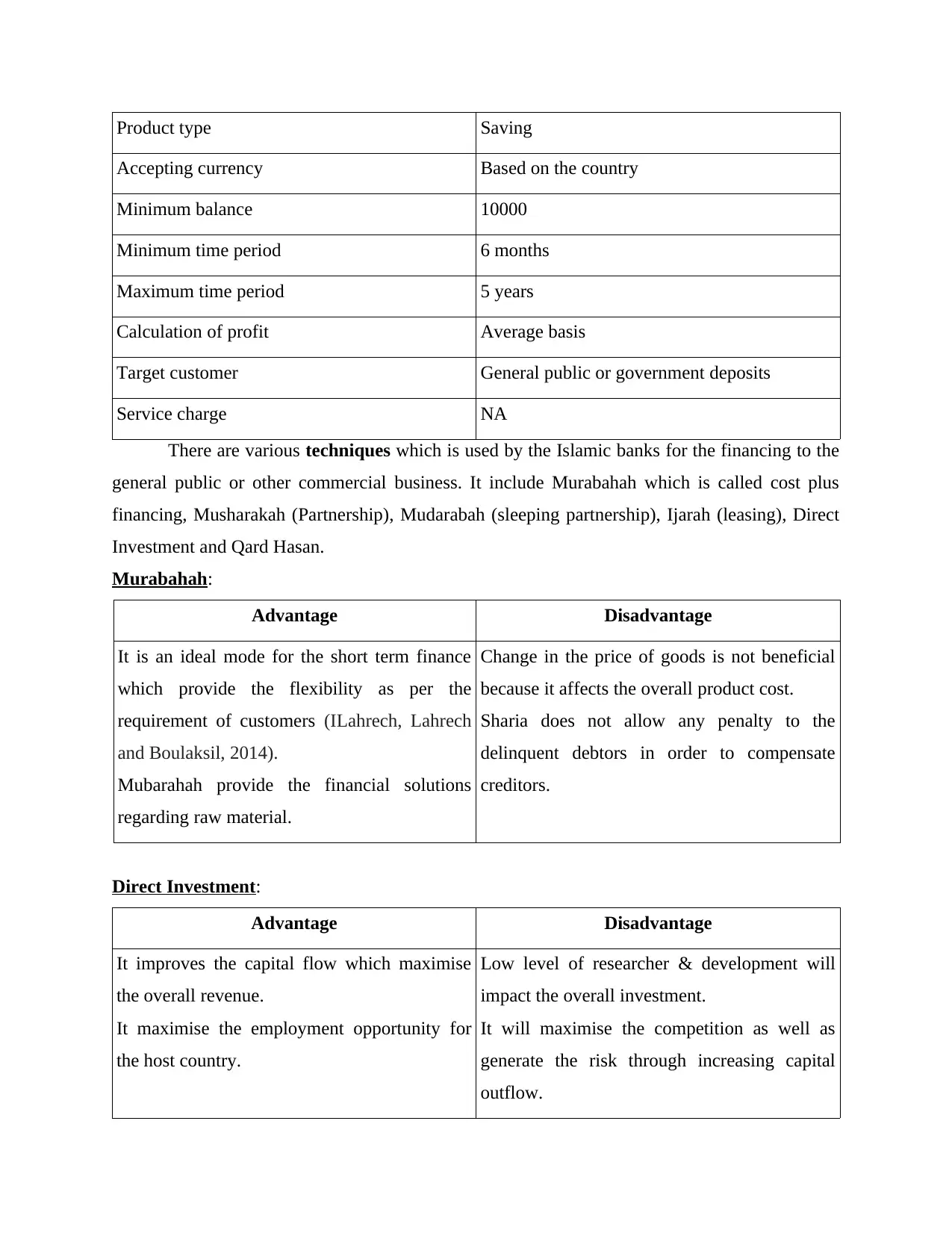
Product type Saving
Accepting currency Based on the country
Minimum balance 10000
Minimum time period 6 months
Maximum time period 5 years
Calculation of profit Average basis
Target customer General public or government deposits
Service charge NA
There are various techniques which is used by the Islamic banks for the financing to the
general public or other commercial business. It include Murabahah which is called cost plus
financing, Musharakah (Partnership), Mudarabah (sleeping partnership), Ijarah (leasing), Direct
Investment and Qard Hasan.
Murabahah:
Advantage Disadvantage
It is an ideal mode for the short term finance
which provide the flexibility as per the
requirement of customers (ILahrech, Lahrech
and Boulaksil, 2014).
Mubarahah provide the financial solutions
regarding raw material.
Change in the price of goods is not beneficial
because it affects the overall product cost.
Sharia does not allow any penalty to the
delinquent debtors in order to compensate
creditors.
Direct Investment:
Advantage Disadvantage
It improves the capital flow which maximise
the overall revenue.
It maximise the employment opportunity for
the host country.
Low level of researcher & development will
impact the overall investment.
It will maximise the competition as well as
generate the risk through increasing capital
outflow.
Accepting currency Based on the country
Minimum balance 10000
Minimum time period 6 months
Maximum time period 5 years
Calculation of profit Average basis
Target customer General public or government deposits
Service charge NA
There are various techniques which is used by the Islamic banks for the financing to the
general public or other commercial business. It include Murabahah which is called cost plus
financing, Musharakah (Partnership), Mudarabah (sleeping partnership), Ijarah (leasing), Direct
Investment and Qard Hasan.
Murabahah:
Advantage Disadvantage
It is an ideal mode for the short term finance
which provide the flexibility as per the
requirement of customers (ILahrech, Lahrech
and Boulaksil, 2014).
Mubarahah provide the financial solutions
regarding raw material.
Change in the price of goods is not beneficial
because it affects the overall product cost.
Sharia does not allow any penalty to the
delinquent debtors in order to compensate
creditors.
Direct Investment:
Advantage Disadvantage
It improves the capital flow which maximise
the overall revenue.
It maximise the employment opportunity for
the host country.
Low level of researcher & development will
impact the overall investment.
It will maximise the competition as well as
generate the risk through increasing capital
outflow.
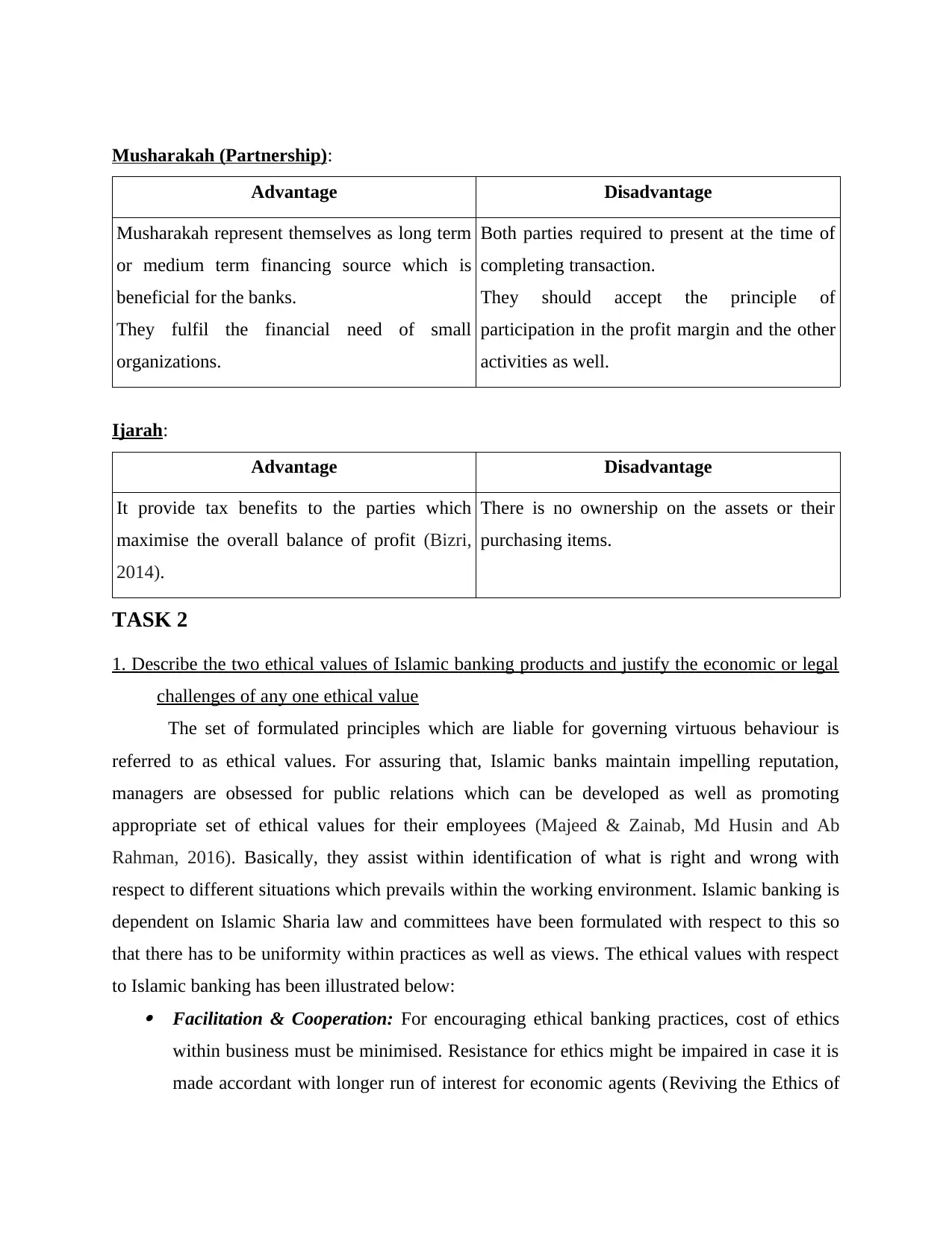
Musharakah (Partnership):
Advantage Disadvantage
Musharakah represent themselves as long term
or medium term financing source which is
beneficial for the banks.
They fulfil the financial need of small
organizations.
Both parties required to present at the time of
completing transaction.
They should accept the principle of
participation in the profit margin and the other
activities as well.
Ijarah:
Advantage Disadvantage
It provide tax benefits to the parties which
maximise the overall balance of profit (Bizri,
2014).
There is no ownership on the assets or their
purchasing items.
TASK 2
1. Describe the two ethical values of Islamic banking products and justify the economic or legal
challenges of any one ethical value
The set of formulated principles which are liable for governing virtuous behaviour is
referred to as ethical values. For assuring that, Islamic banks maintain impelling reputation,
managers are obsessed for public relations which can be developed as well as promoting
appropriate set of ethical values for their employees (Majeed & Zainab, Md Husin and Ab
Rahman, 2016). Basically, they assist within identification of what is right and wrong with
respect to different situations which prevails within the working environment. Islamic banking is
dependent on Islamic Sharia law and committees have been formulated with respect to this so
that there has to be uniformity within practices as well as views. The ethical values with respect
to Islamic banking has been illustrated below: Facilitation & Cooperation: For encouraging ethical banking practices, cost of ethics
within business must be minimised. Resistance for ethics might be impaired in case it is
made accordant with longer run of interest for economic agents (Reviving the Ethics of
Advantage Disadvantage
Musharakah represent themselves as long term
or medium term financing source which is
beneficial for the banks.
They fulfil the financial need of small
organizations.
Both parties required to present at the time of
completing transaction.
They should accept the principle of
participation in the profit margin and the other
activities as well.
Ijarah:
Advantage Disadvantage
It provide tax benefits to the parties which
maximise the overall balance of profit (Bizri,
2014).
There is no ownership on the assets or their
purchasing items.
TASK 2
1. Describe the two ethical values of Islamic banking products and justify the economic or legal
challenges of any one ethical value
The set of formulated principles which are liable for governing virtuous behaviour is
referred to as ethical values. For assuring that, Islamic banks maintain impelling reputation,
managers are obsessed for public relations which can be developed as well as promoting
appropriate set of ethical values for their employees (Majeed & Zainab, Md Husin and Ab
Rahman, 2016). Basically, they assist within identification of what is right and wrong with
respect to different situations which prevails within the working environment. Islamic banking is
dependent on Islamic Sharia law and committees have been formulated with respect to this so
that there has to be uniformity within practices as well as views. The ethical values with respect
to Islamic banking has been illustrated below: Facilitation & Cooperation: For encouraging ethical banking practices, cost of ethics
within business must be minimised. Resistance for ethics might be impaired in case it is
made accordant with longer run of interest for economic agents (Reviving the Ethics of
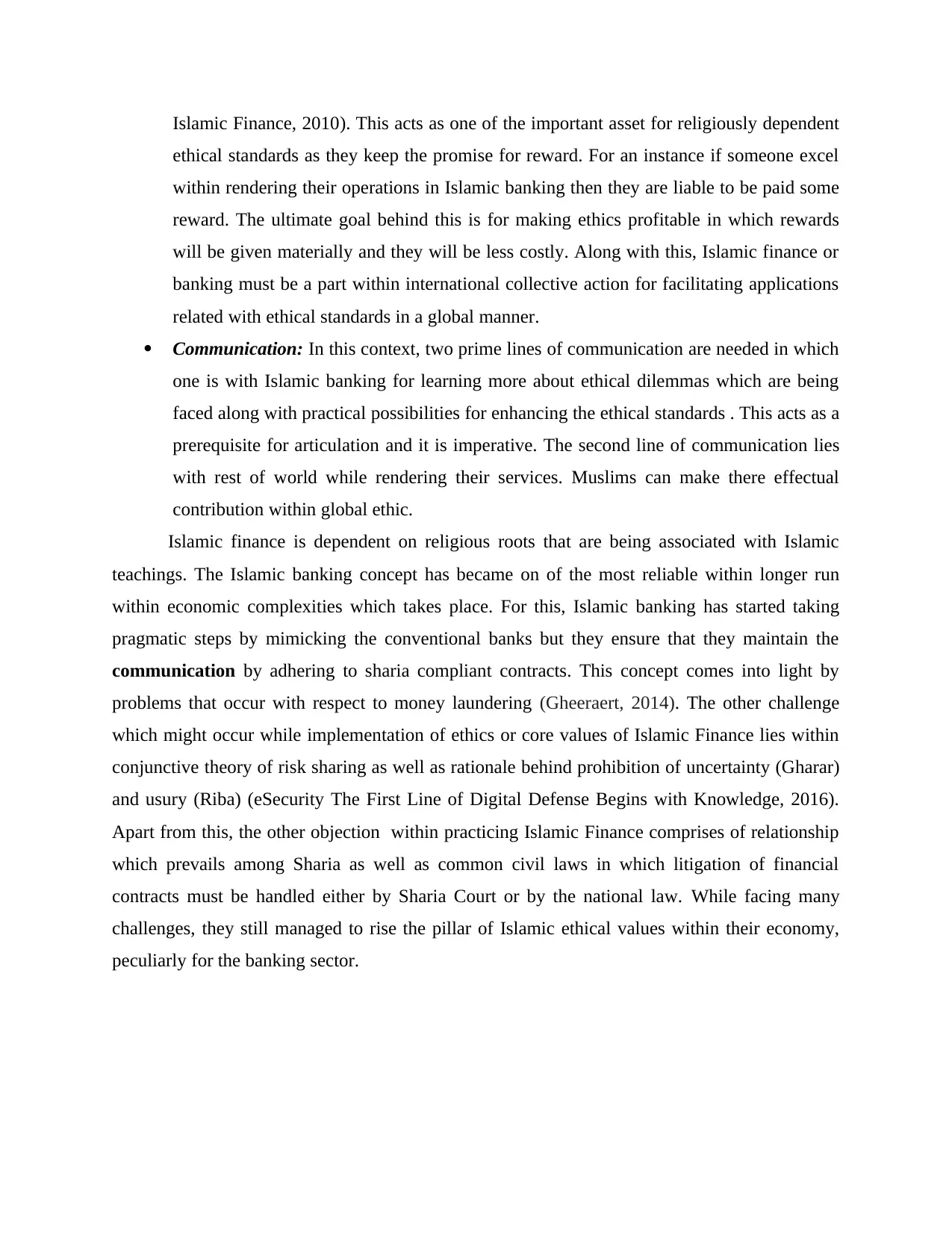
Islamic Finance, 2010). This acts as one of the important asset for religiously dependent
ethical standards as they keep the promise for reward. For an instance if someone excel
within rendering their operations in Islamic banking then they are liable to be paid some
reward. The ultimate goal behind this is for making ethics profitable in which rewards
will be given materially and they will be less costly. Along with this, Islamic finance or
banking must be a part within international collective action for facilitating applications
related with ethical standards in a global manner.
Communication: In this context, two prime lines of communication are needed in which
one is with Islamic banking for learning more about ethical dilemmas which are being
faced along with practical possibilities for enhancing the ethical standards . This acts as a
prerequisite for articulation and it is imperative. The second line of communication lies
with rest of world while rendering their services. Muslims can make there effectual
contribution within global ethic.
Islamic finance is dependent on religious roots that are being associated with Islamic
teachings. The Islamic banking concept has became on of the most reliable within longer run
within economic complexities which takes place. For this, Islamic banking has started taking
pragmatic steps by mimicking the conventional banks but they ensure that they maintain the
communication by adhering to sharia compliant contracts. This concept comes into light by
problems that occur with respect to money laundering (Gheeraert, 2014). The other challenge
which might occur while implementation of ethics or core values of Islamic Finance lies within
conjunctive theory of risk sharing as well as rationale behind prohibition of uncertainty (Gharar)
and usury (Riba) (eSecurity The First Line of Digital Defense Begins with Knowledge, 2016).
Apart from this, the other objection within practicing Islamic Finance comprises of relationship
which prevails among Sharia as well as common civil laws in which litigation of financial
contracts must be handled either by Sharia Court or by the national law. While facing many
challenges, they still managed to rise the pillar of Islamic ethical values within their economy,
peculiarly for the banking sector.
ethical standards as they keep the promise for reward. For an instance if someone excel
within rendering their operations in Islamic banking then they are liable to be paid some
reward. The ultimate goal behind this is for making ethics profitable in which rewards
will be given materially and they will be less costly. Along with this, Islamic finance or
banking must be a part within international collective action for facilitating applications
related with ethical standards in a global manner.
Communication: In this context, two prime lines of communication are needed in which
one is with Islamic banking for learning more about ethical dilemmas which are being
faced along with practical possibilities for enhancing the ethical standards . This acts as a
prerequisite for articulation and it is imperative. The second line of communication lies
with rest of world while rendering their services. Muslims can make there effectual
contribution within global ethic.
Islamic finance is dependent on religious roots that are being associated with Islamic
teachings. The Islamic banking concept has became on of the most reliable within longer run
within economic complexities which takes place. For this, Islamic banking has started taking
pragmatic steps by mimicking the conventional banks but they ensure that they maintain the
communication by adhering to sharia compliant contracts. This concept comes into light by
problems that occur with respect to money laundering (Gheeraert, 2014). The other challenge
which might occur while implementation of ethics or core values of Islamic Finance lies within
conjunctive theory of risk sharing as well as rationale behind prohibition of uncertainty (Gharar)
and usury (Riba) (eSecurity The First Line of Digital Defense Begins with Knowledge, 2016).
Apart from this, the other objection within practicing Islamic Finance comprises of relationship
which prevails among Sharia as well as common civil laws in which litigation of financial
contracts must be handled either by Sharia Court or by the national law. While facing many
challenges, they still managed to rise the pillar of Islamic ethical values within their economy,
peculiarly for the banking sector.
Secure Best Marks with AI Grader
Need help grading? Try our AI Grader for instant feedback on your assignments.
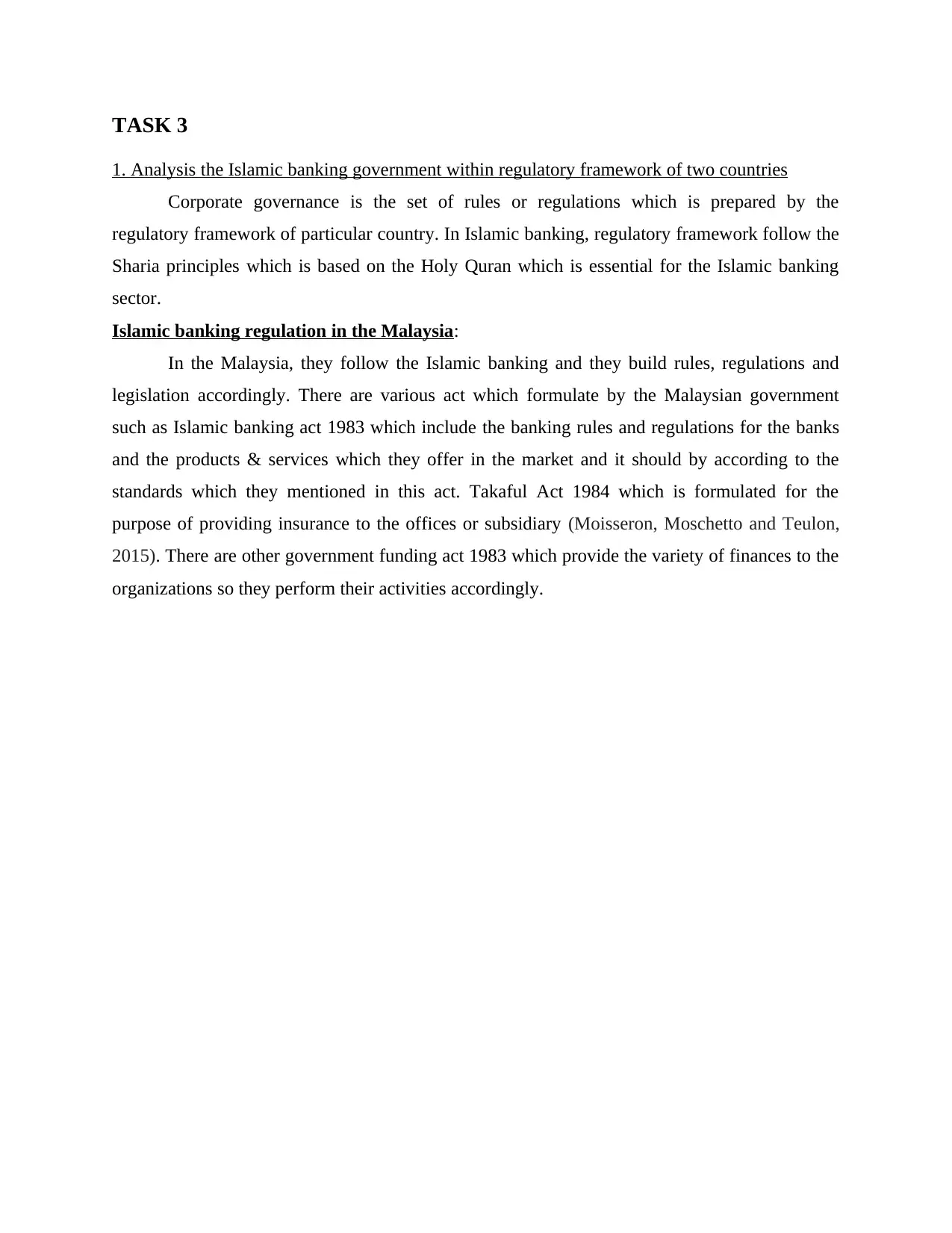
TASK 3
1. Analysis the Islamic banking government within regulatory framework of two countries
Corporate governance is the set of rules or regulations which is prepared by the
regulatory framework of particular country. In Islamic banking, regulatory framework follow the
Sharia principles which is based on the Holy Quran which is essential for the Islamic banking
sector.
Islamic banking regulation in the Malaysia:
In the Malaysia, they follow the Islamic banking and they build rules, regulations and
legislation accordingly. There are various act which formulate by the Malaysian government
such as Islamic banking act 1983 which include the banking rules and regulations for the banks
and the products & services which they offer in the market and it should by according to the
standards which they mentioned in this act. Takaful Act 1984 which is formulated for the
purpose of providing insurance to the offices or subsidiary (Moisseron, Moschetto and Teulon,
2015). There are other government funding act 1983 which provide the variety of finances to the
organizations so they perform their activities accordingly.
1. Analysis the Islamic banking government within regulatory framework of two countries
Corporate governance is the set of rules or regulations which is prepared by the
regulatory framework of particular country. In Islamic banking, regulatory framework follow the
Sharia principles which is based on the Holy Quran which is essential for the Islamic banking
sector.
Islamic banking regulation in the Malaysia:
In the Malaysia, they follow the Islamic banking and they build rules, regulations and
legislation accordingly. There are various act which formulate by the Malaysian government
such as Islamic banking act 1983 which include the banking rules and regulations for the banks
and the products & services which they offer in the market and it should by according to the
standards which they mentioned in this act. Takaful Act 1984 which is formulated for the
purpose of providing insurance to the offices or subsidiary (Moisseron, Moschetto and Teulon,
2015). There are other government funding act 1983 which provide the variety of finances to the
organizations so they perform their activities accordingly.
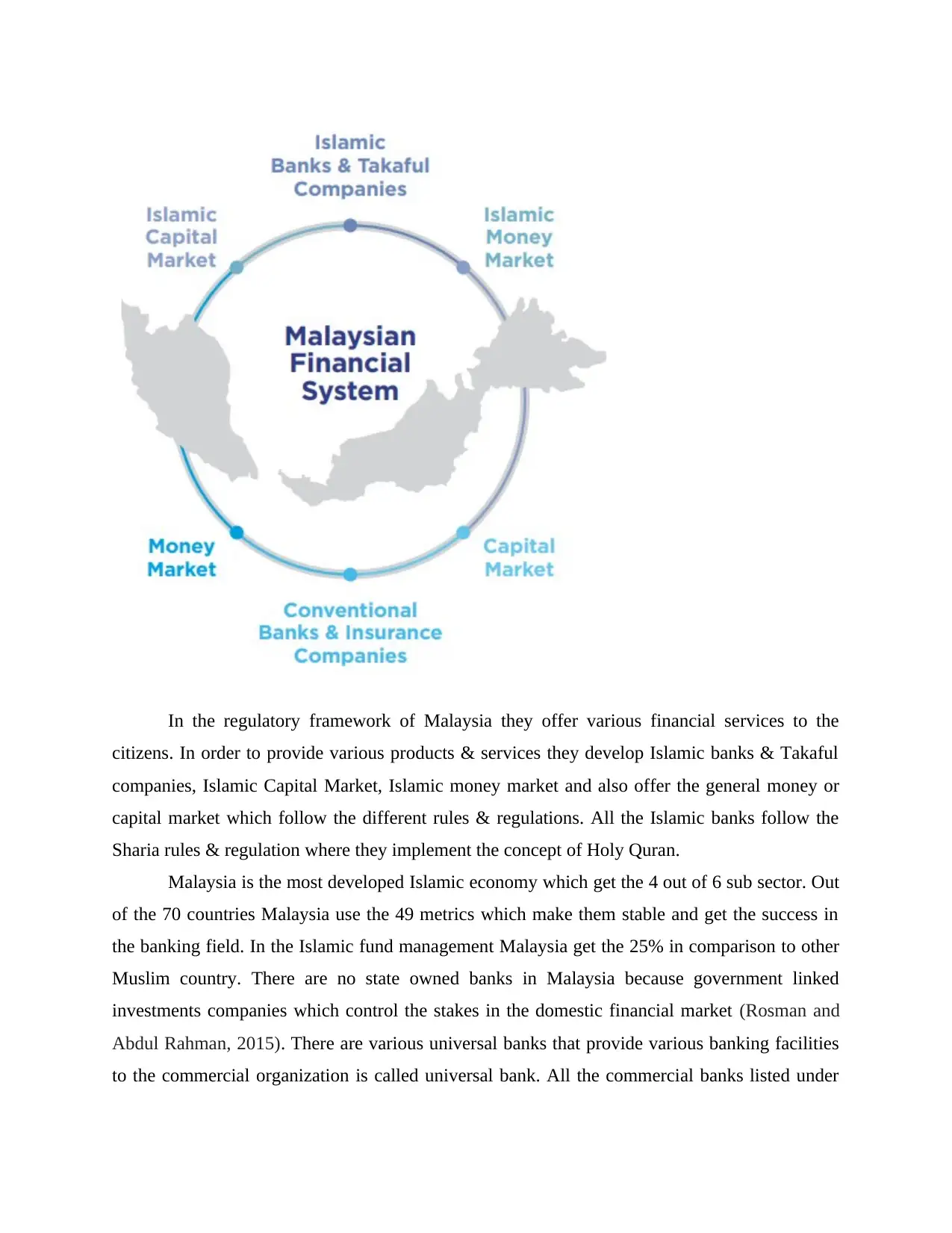
In the regulatory framework of Malaysia they offer various financial services to the
citizens. In order to provide various products & services they develop Islamic banks & Takaful
companies, Islamic Capital Market, Islamic money market and also offer the general money or
capital market which follow the different rules & regulations. All the Islamic banks follow the
Sharia rules & regulation where they implement the concept of Holy Quran.
Malaysia is the most developed Islamic economy which get the 4 out of 6 sub sector. Out
of the 70 countries Malaysia use the 49 metrics which make them stable and get the success in
the banking field. In the Islamic fund management Malaysia get the 25% in comparison to other
Muslim country. There are no state owned banks in Malaysia because government linked
investments companies which control the stakes in the domestic financial market (Rosman and
Abdul Rahman, 2015). There are various universal banks that provide various banking facilities
to the commercial organization is called universal bank. All the commercial banks listed under
citizens. In order to provide various products & services they develop Islamic banks & Takaful
companies, Islamic Capital Market, Islamic money market and also offer the general money or
capital market which follow the different rules & regulations. All the Islamic banks follow the
Sharia rules & regulation where they implement the concept of Holy Quran.
Malaysia is the most developed Islamic economy which get the 4 out of 6 sub sector. Out
of the 70 countries Malaysia use the 49 metrics which make them stable and get the success in
the banking field. In the Islamic fund management Malaysia get the 25% in comparison to other
Muslim country. There are no state owned banks in Malaysia because government linked
investments companies which control the stakes in the domestic financial market (Rosman and
Abdul Rahman, 2015). There are various universal banks that provide various banking facilities
to the commercial organization is called universal bank. All the commercial banks listed under
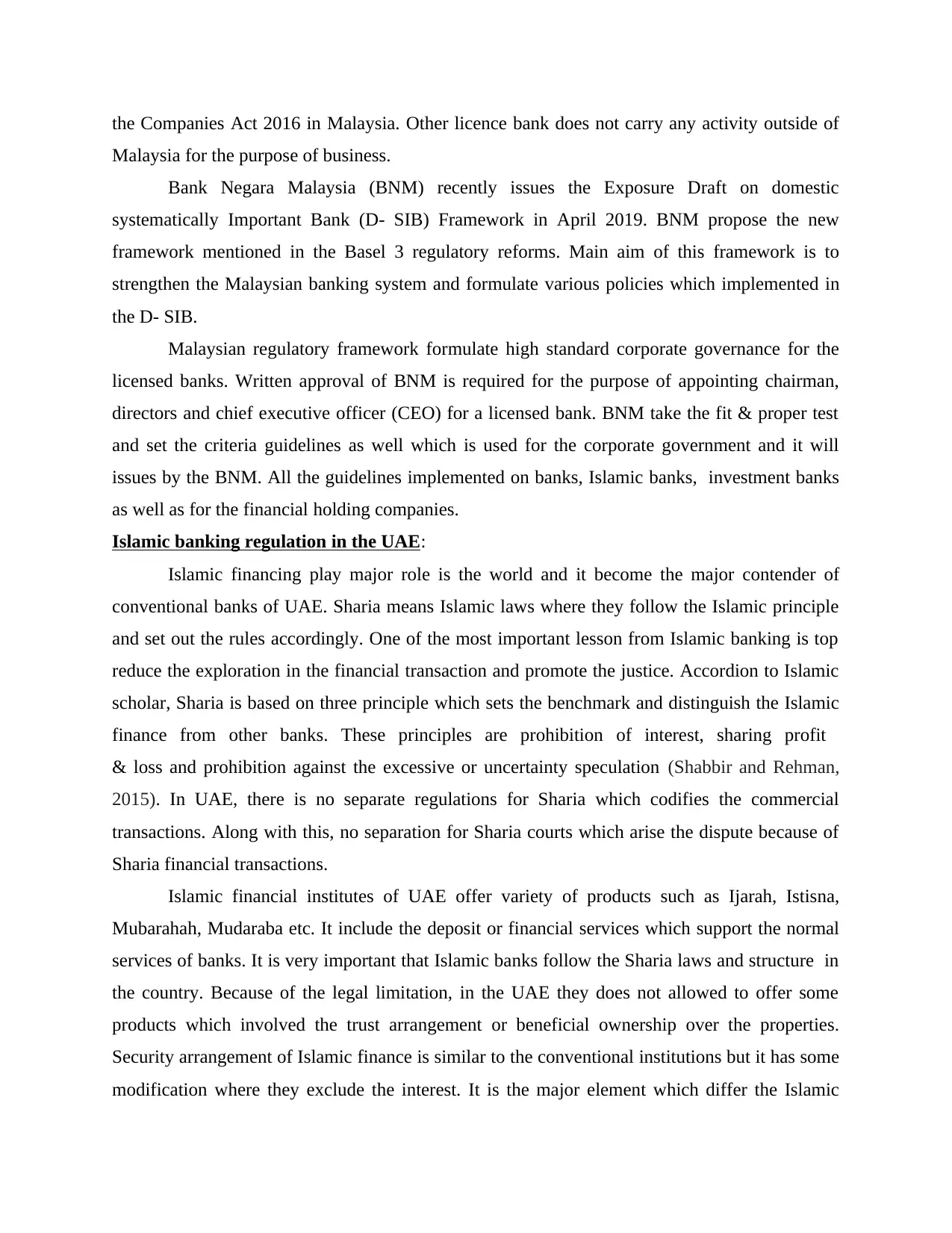
the Companies Act 2016 in Malaysia. Other licence bank does not carry any activity outside of
Malaysia for the purpose of business.
Bank Negara Malaysia (BNM) recently issues the Exposure Draft on domestic
systematically Important Bank (D- SIB) Framework in April 2019. BNM propose the new
framework mentioned in the Basel 3 regulatory reforms. Main aim of this framework is to
strengthen the Malaysian banking system and formulate various policies which implemented in
the D- SIB.
Malaysian regulatory framework formulate high standard corporate governance for the
licensed banks. Written approval of BNM is required for the purpose of appointing chairman,
directors and chief executive officer (CEO) for a licensed bank. BNM take the fit & proper test
and set the criteria guidelines as well which is used for the corporate government and it will
issues by the BNM. All the guidelines implemented on banks, Islamic banks, investment banks
as well as for the financial holding companies.
Islamic banking regulation in the UAE:
Islamic financing play major role is the world and it become the major contender of
conventional banks of UAE. Sharia means Islamic laws where they follow the Islamic principle
and set out the rules accordingly. One of the most important lesson from Islamic banking is top
reduce the exploration in the financial transaction and promote the justice. Accordion to Islamic
scholar, Sharia is based on three principle which sets the benchmark and distinguish the Islamic
finance from other banks. These principles are prohibition of interest, sharing profit
& loss and prohibition against the excessive or uncertainty speculation (Shabbir and Rehman,
2015). In UAE, there is no separate regulations for Sharia which codifies the commercial
transactions. Along with this, no separation for Sharia courts which arise the dispute because of
Sharia financial transactions.
Islamic financial institutes of UAE offer variety of products such as Ijarah, Istisna,
Mubarahah, Mudaraba etc. It include the deposit or financial services which support the normal
services of banks. It is very important that Islamic banks follow the Sharia laws and structure in
the country. Because of the legal limitation, in the UAE they does not allowed to offer some
products which involved the trust arrangement or beneficial ownership over the properties.
Security arrangement of Islamic finance is similar to the conventional institutions but it has some
modification where they exclude the interest. It is the major element which differ the Islamic
Malaysia for the purpose of business.
Bank Negara Malaysia (BNM) recently issues the Exposure Draft on domestic
systematically Important Bank (D- SIB) Framework in April 2019. BNM propose the new
framework mentioned in the Basel 3 regulatory reforms. Main aim of this framework is to
strengthen the Malaysian banking system and formulate various policies which implemented in
the D- SIB.
Malaysian regulatory framework formulate high standard corporate governance for the
licensed banks. Written approval of BNM is required for the purpose of appointing chairman,
directors and chief executive officer (CEO) for a licensed bank. BNM take the fit & proper test
and set the criteria guidelines as well which is used for the corporate government and it will
issues by the BNM. All the guidelines implemented on banks, Islamic banks, investment banks
as well as for the financial holding companies.
Islamic banking regulation in the UAE:
Islamic financing play major role is the world and it become the major contender of
conventional banks of UAE. Sharia means Islamic laws where they follow the Islamic principle
and set out the rules accordingly. One of the most important lesson from Islamic banking is top
reduce the exploration in the financial transaction and promote the justice. Accordion to Islamic
scholar, Sharia is based on three principle which sets the benchmark and distinguish the Islamic
finance from other banks. These principles are prohibition of interest, sharing profit
& loss and prohibition against the excessive or uncertainty speculation (Shabbir and Rehman,
2015). In UAE, there is no separate regulations for Sharia which codifies the commercial
transactions. Along with this, no separation for Sharia courts which arise the dispute because of
Sharia financial transactions.
Islamic financial institutes of UAE offer variety of products such as Ijarah, Istisna,
Mubarahah, Mudaraba etc. It include the deposit or financial services which support the normal
services of banks. It is very important that Islamic banks follow the Sharia laws and structure in
the country. Because of the legal limitation, in the UAE they does not allowed to offer some
products which involved the trust arrangement or beneficial ownership over the properties.
Security arrangement of Islamic finance is similar to the conventional institutions but it has some
modification where they exclude the interest. It is the major element which differ the Islamic
Paraphrase This Document
Need a fresh take? Get an instant paraphrase of this document with our AI Paraphraser
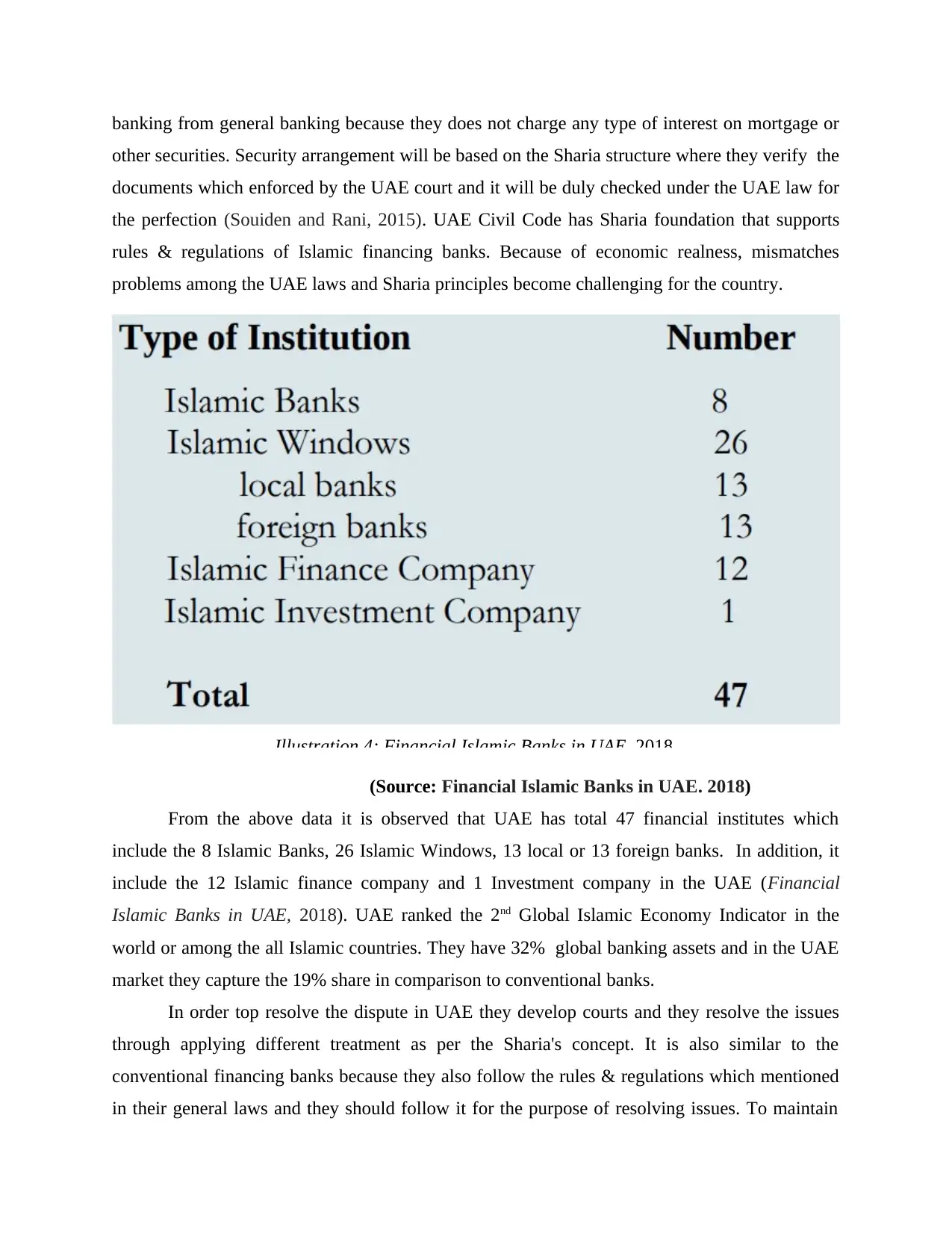
banking from general banking because they does not charge any type of interest on mortgage or
other securities. Security arrangement will be based on the Sharia structure where they verify the
documents which enforced by the UAE court and it will be duly checked under the UAE law for
the perfection (Souiden and Rani, 2015). UAE Civil Code has Sharia foundation that supports
rules & regulations of Islamic financing banks. Because of economic realness, mismatches
problems among the UAE laws and Sharia principles become challenging for the country.
Illustration 4: Financial Islamic Banks in UAE, 2018.
(Source: Financial Islamic Banks in UAE. 2018)
From the above data it is observed that UAE has total 47 financial institutes which
include the 8 Islamic Banks, 26 Islamic Windows, 13 local or 13 foreign banks. In addition, it
include the 12 Islamic finance company and 1 Investment company in the UAE (Financial
Islamic Banks in UAE, 2018). UAE ranked the 2nd Global Islamic Economy Indicator in the
world or among the all Islamic countries. They have 32% global banking assets and in the UAE
market they capture the 19% share in comparison to conventional banks.
In order top resolve the dispute in UAE they develop courts and they resolve the issues
through applying different treatment as per the Sharia's concept. It is also similar to the
conventional financing banks because they also follow the rules & regulations which mentioned
in their general laws and they should follow it for the purpose of resolving issues. To maintain
other securities. Security arrangement will be based on the Sharia structure where they verify the
documents which enforced by the UAE court and it will be duly checked under the UAE law for
the perfection (Souiden and Rani, 2015). UAE Civil Code has Sharia foundation that supports
rules & regulations of Islamic financing banks. Because of economic realness, mismatches
problems among the UAE laws and Sharia principles become challenging for the country.
Illustration 4: Financial Islamic Banks in UAE, 2018.
(Source: Financial Islamic Banks in UAE. 2018)
From the above data it is observed that UAE has total 47 financial institutes which
include the 8 Islamic Banks, 26 Islamic Windows, 13 local or 13 foreign banks. In addition, it
include the 12 Islamic finance company and 1 Investment company in the UAE (Financial
Islamic Banks in UAE, 2018). UAE ranked the 2nd Global Islamic Economy Indicator in the
world or among the all Islamic countries. They have 32% global banking assets and in the UAE
market they capture the 19% share in comparison to conventional banks.
In order top resolve the dispute in UAE they develop courts and they resolve the issues
through applying different treatment as per the Sharia's concept. It is also similar to the
conventional financing banks because they also follow the rules & regulations which mentioned
in their general laws and they should follow it for the purpose of resolving issues. To maintain
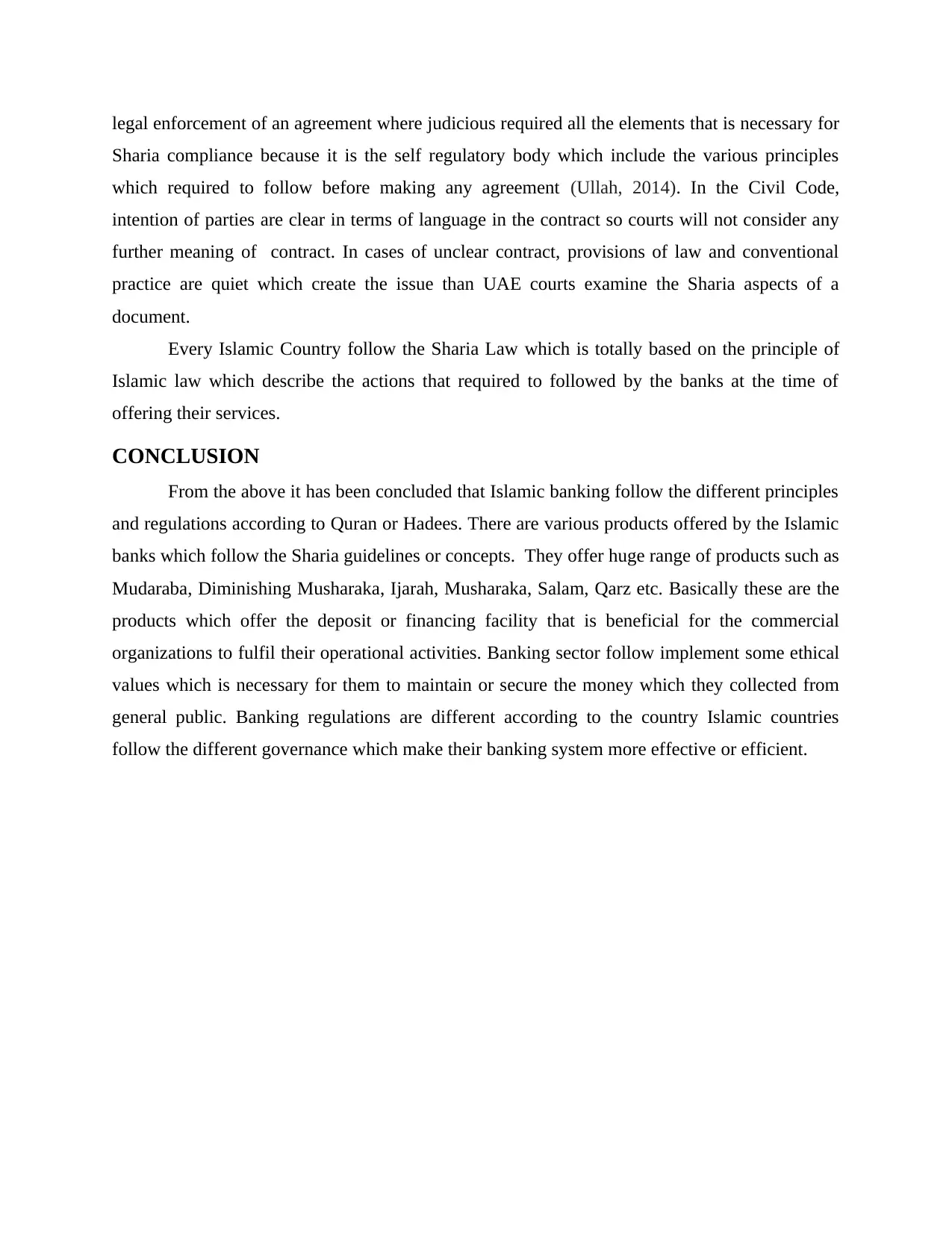
legal enforcement of an agreement where judicious required all the elements that is necessary for
Sharia compliance because it is the self regulatory body which include the various principles
which required to follow before making any agreement (Ullah, 2014). In the Civil Code,
intention of parties are clear in terms of language in the contract so courts will not consider any
further meaning of contract. In cases of unclear contract, provisions of law and conventional
practice are quiet which create the issue than UAE courts examine the Sharia aspects of a
document.
Every Islamic Country follow the Sharia Law which is totally based on the principle of
Islamic law which describe the actions that required to followed by the banks at the time of
offering their services.
CONCLUSION
From the above it has been concluded that Islamic banking follow the different principles
and regulations according to Quran or Hadees. There are various products offered by the Islamic
banks which follow the Sharia guidelines or concepts. They offer huge range of products such as
Mudaraba, Diminishing Musharaka, Ijarah, Musharaka, Salam, Qarz etc. Basically these are the
products which offer the deposit or financing facility that is beneficial for the commercial
organizations to fulfil their operational activities. Banking sector follow implement some ethical
values which is necessary for them to maintain or secure the money which they collected from
general public. Banking regulations are different according to the country Islamic countries
follow the different governance which make their banking system more effective or efficient.
Sharia compliance because it is the self regulatory body which include the various principles
which required to follow before making any agreement (Ullah, 2014). In the Civil Code,
intention of parties are clear in terms of language in the contract so courts will not consider any
further meaning of contract. In cases of unclear contract, provisions of law and conventional
practice are quiet which create the issue than UAE courts examine the Sharia aspects of a
document.
Every Islamic Country follow the Sharia Law which is totally based on the principle of
Islamic law which describe the actions that required to followed by the banks at the time of
offering their services.
CONCLUSION
From the above it has been concluded that Islamic banking follow the different principles
and regulations according to Quran or Hadees. There are various products offered by the Islamic
banks which follow the Sharia guidelines or concepts. They offer huge range of products such as
Mudaraba, Diminishing Musharaka, Ijarah, Musharaka, Salam, Qarz etc. Basically these are the
products which offer the deposit or financing facility that is beneficial for the commercial
organizations to fulfil their operational activities. Banking sector follow implement some ethical
values which is necessary for them to maintain or secure the money which they collected from
general public. Banking regulations are different according to the country Islamic countries
follow the different governance which make their banking system more effective or efficient.
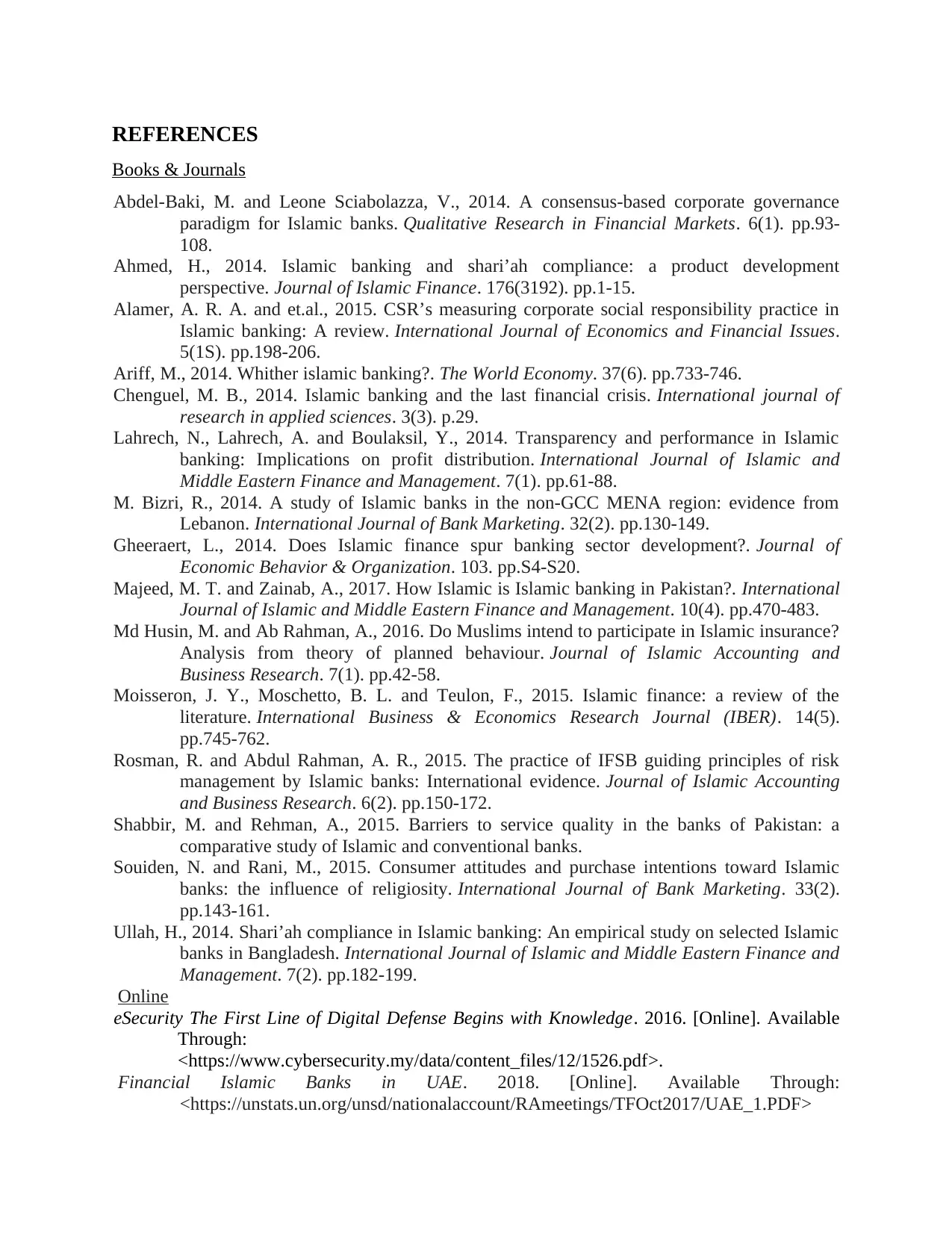
REFERENCES
Books & Journals
Abdel-Baki, M. and Leone Sciabolazza, V., 2014. A consensus-based corporate governance
paradigm for Islamic banks. Qualitative Research in Financial Markets. 6(1). pp.93-
108.
Ahmed, H., 2014. Islamic banking and shari’ah compliance: a product development
perspective. Journal of Islamic Finance. 176(3192). pp.1-15.
Alamer, A. R. A. and et.al., 2015. CSR’s measuring corporate social responsibility practice in
Islamic banking: A review. International Journal of Economics and Financial Issues.
5(1S). pp.198-206.
Ariff, M., 2014. Whither islamic banking?. The World Economy. 37(6). pp.733-746.
Chenguel, M. B., 2014. Islamic banking and the last financial crisis. International journal of
research in applied sciences. 3(3). p.29.
Lahrech, N., Lahrech, A. and Boulaksil, Y., 2014. Transparency and performance in Islamic
banking: Implications on profit distribution. International Journal of Islamic and
Middle Eastern Finance and Management. 7(1). pp.61-88.
M. Bizri, R., 2014. A study of Islamic banks in the non-GCC MENA region: evidence from
Lebanon. International Journal of Bank Marketing. 32(2). pp.130-149.
Gheeraert, L., 2014. Does Islamic finance spur banking sector development?. Journal of
Economic Behavior & Organization. 103. pp.S4-S20.
Majeed, M. T. and Zainab, A., 2017. How Islamic is Islamic banking in Pakistan?. International
Journal of Islamic and Middle Eastern Finance and Management. 10(4). pp.470-483.
Md Husin, M. and Ab Rahman, A., 2016. Do Muslims intend to participate in Islamic insurance?
Analysis from theory of planned behaviour. Journal of Islamic Accounting and
Business Research. 7(1). pp.42-58.
Moisseron, J. Y., Moschetto, B. L. and Teulon, F., 2015. Islamic finance: a review of the
literature. International Business & Economics Research Journal (IBER). 14(5).
pp.745-762.
Rosman, R. and Abdul Rahman, A. R., 2015. The practice of IFSB guiding principles of risk
management by Islamic banks: International evidence. Journal of Islamic Accounting
and Business Research. 6(2). pp.150-172.
Shabbir, M. and Rehman, A., 2015. Barriers to service quality in the banks of Pakistan: a
comparative study of Islamic and conventional banks.
Souiden, N. and Rani, M., 2015. Consumer attitudes and purchase intentions toward Islamic
banks: the influence of religiosity. International Journal of Bank Marketing. 33(2).
pp.143-161.
Ullah, H., 2014. Shari’ah compliance in Islamic banking: An empirical study on selected Islamic
banks in Bangladesh. International Journal of Islamic and Middle Eastern Finance and
Management. 7(2). pp.182-199.
Online
eSecurity The First Line of Digital Defense Begins with Knowledge. 2016. [Online]. Available
Through:
<https://www.cybersecurity.my/data/content_files/12/1526.pdf>.
Financial Islamic Banks in UAE. 2018. [Online]. Available Through:
<https://unstats.un.org/unsd/nationalaccount/RAmeetings/TFOct2017/UAE_1.PDF>
Books & Journals
Abdel-Baki, M. and Leone Sciabolazza, V., 2014. A consensus-based corporate governance
paradigm for Islamic banks. Qualitative Research in Financial Markets. 6(1). pp.93-
108.
Ahmed, H., 2014. Islamic banking and shari’ah compliance: a product development
perspective. Journal of Islamic Finance. 176(3192). pp.1-15.
Alamer, A. R. A. and et.al., 2015. CSR’s measuring corporate social responsibility practice in
Islamic banking: A review. International Journal of Economics and Financial Issues.
5(1S). pp.198-206.
Ariff, M., 2014. Whither islamic banking?. The World Economy. 37(6). pp.733-746.
Chenguel, M. B., 2014. Islamic banking and the last financial crisis. International journal of
research in applied sciences. 3(3). p.29.
Lahrech, N., Lahrech, A. and Boulaksil, Y., 2014. Transparency and performance in Islamic
banking: Implications on profit distribution. International Journal of Islamic and
Middle Eastern Finance and Management. 7(1). pp.61-88.
M. Bizri, R., 2014. A study of Islamic banks in the non-GCC MENA region: evidence from
Lebanon. International Journal of Bank Marketing. 32(2). pp.130-149.
Gheeraert, L., 2014. Does Islamic finance spur banking sector development?. Journal of
Economic Behavior & Organization. 103. pp.S4-S20.
Majeed, M. T. and Zainab, A., 2017. How Islamic is Islamic banking in Pakistan?. International
Journal of Islamic and Middle Eastern Finance and Management. 10(4). pp.470-483.
Md Husin, M. and Ab Rahman, A., 2016. Do Muslims intend to participate in Islamic insurance?
Analysis from theory of planned behaviour. Journal of Islamic Accounting and
Business Research. 7(1). pp.42-58.
Moisseron, J. Y., Moschetto, B. L. and Teulon, F., 2015. Islamic finance: a review of the
literature. International Business & Economics Research Journal (IBER). 14(5).
pp.745-762.
Rosman, R. and Abdul Rahman, A. R., 2015. The practice of IFSB guiding principles of risk
management by Islamic banks: International evidence. Journal of Islamic Accounting
and Business Research. 6(2). pp.150-172.
Shabbir, M. and Rehman, A., 2015. Barriers to service quality in the banks of Pakistan: a
comparative study of Islamic and conventional banks.
Souiden, N. and Rani, M., 2015. Consumer attitudes and purchase intentions toward Islamic
banks: the influence of religiosity. International Journal of Bank Marketing. 33(2).
pp.143-161.
Ullah, H., 2014. Shari’ah compliance in Islamic banking: An empirical study on selected Islamic
banks in Bangladesh. International Journal of Islamic and Middle Eastern Finance and
Management. 7(2). pp.182-199.
Online
eSecurity The First Line of Digital Defense Begins with Knowledge. 2016. [Online]. Available
Through:
<https://www.cybersecurity.my/data/content_files/12/1526.pdf>.
Financial Islamic Banks in UAE. 2018. [Online]. Available Through:
<https://unstats.un.org/unsd/nationalaccount/RAmeetings/TFOct2017/UAE_1.PDF>
Secure Best Marks with AI Grader
Need help grading? Try our AI Grader for instant feedback on your assignments.
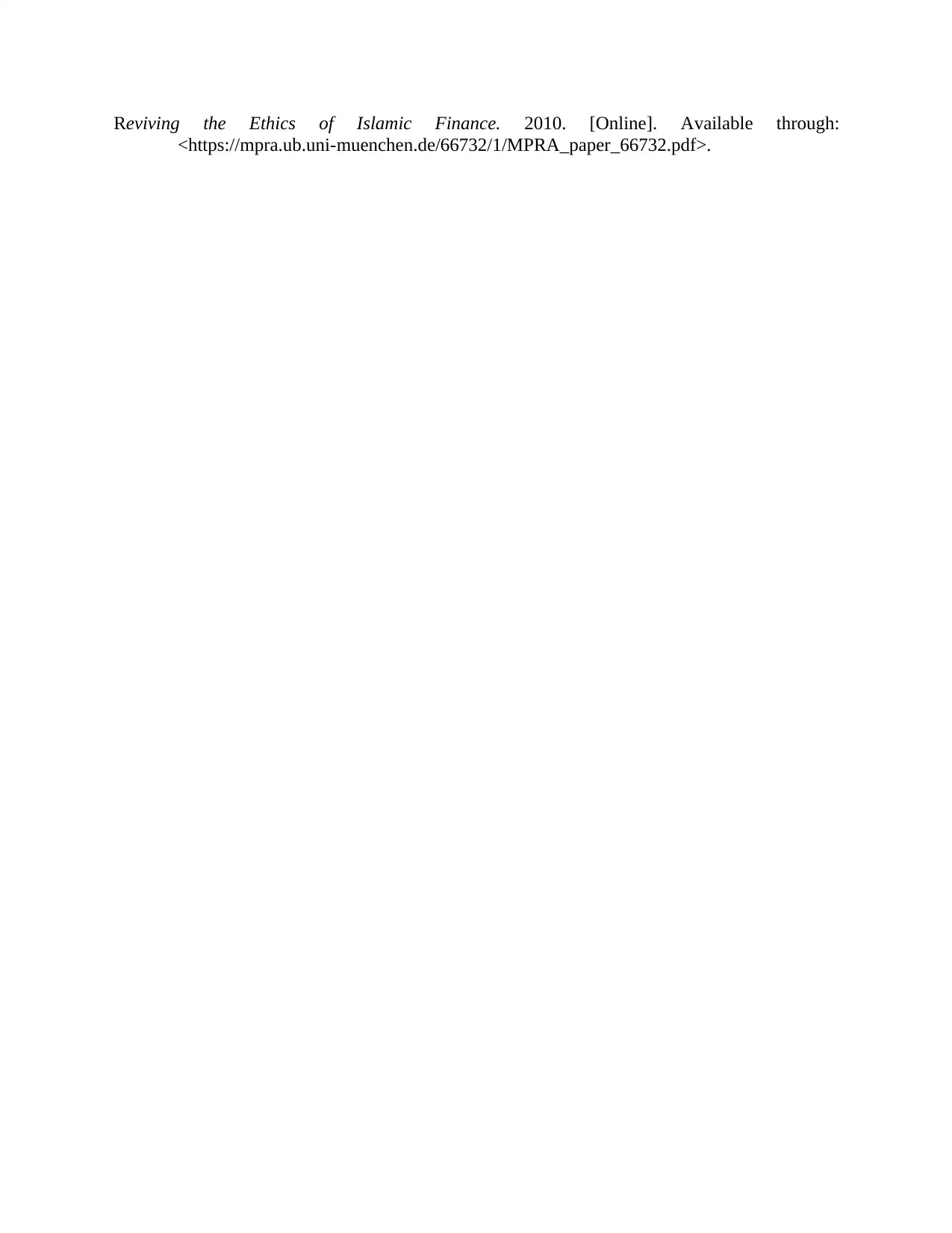
Reviving the Ethics of Islamic Finance. 2010. [Online]. Available through:
<https://mpra.ub.uni-muenchen.de/66732/1/MPRA_paper_66732.pdf>.
<https://mpra.ub.uni-muenchen.de/66732/1/MPRA_paper_66732.pdf>.
1 out of 17
Your All-in-One AI-Powered Toolkit for Academic Success.
+13062052269
info@desklib.com
Available 24*7 on WhatsApp / Email
![[object Object]](/_next/static/media/star-bottom.7253800d.svg)
Unlock your academic potential
© 2024 | Zucol Services PVT LTD | All rights reserved.


